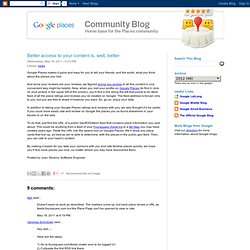

Places By Design - click first thumbnail. Google Local Search, Local Search Ranking, SEO, Citations, Reviews. For many of my clients, being found by those searching for local businesses can make a huge difference in the number of inbound leads they receive.
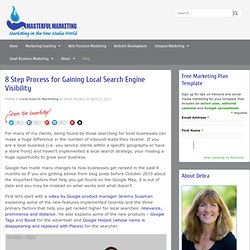
If you are a local business (i.e. you service clients within a specific geography or have a store front) and haven’t implemented a local search strategy, your missing a huge opportunity to grow your business. Google has made many changes to how businesses get ranked in the past 6 months so if you are getting advice from blog posts before October 2010 about the important factors that help you get found on the Google Map, it is out of date and you may be mislead on what works and what doesn’t. First let’s start with a video by Google product manager Jeremy Sussman explaining some of the new features implemented recently and the three primary factors that help you get ranked higher for local searches: relevance, prominence and distance. The goal of this effort is to build confidence with search engines that your business is legitimate.
How Local Search Ranking Works.
7827052. Reviews. Patch. Online Reviews Tool - Learn How To Ask Your Best Customers for Online Reviews. New Google Mobile Features: Shortcut Local Icons, Query Builder. At today’s Google Inside Search event in San Francisco, a number of new features were unveiled for both mobile and desktop search, which we’ll cover in detail across Search Engine Land.
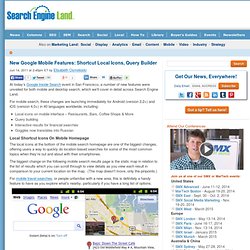
For mobile search, these changes are launching immediately for Android (version 2.2+) and iOS (version 4.0+) in 40 languages worldwide, including: Local icons on mobile interface – Restaurants, Bars, Coffee Shops & MoreQuery buildingInteractive results for financial searchesGoggles now translates into Russian Local Shortcut Icons On Mobile Homepage The local icons at the bottom of the mobile search homepage are one of the biggest changes, offering users a way to quickly do location-based searches for some of the most common topics when they’re out and about with their smartphones.
Google Calendar Appointment Slots – Infrastructure for Places Scheduling? Places and similar products have slowly been moving towards becoming a transaction environment.
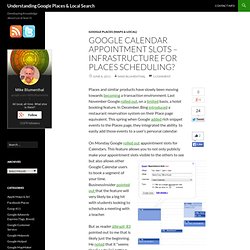
Last November Google rolled out, on a limited basis, a hotel booking feature. In December, Bing introduced a restaurant reservation system on their Place page equivalent. This spring when Google added rich snippet events to the Places page, they integrated the ability to easily add those events to a user’s personal calendar. On Monday Google rolled out appointment slots for Calendars. This feature allows you to not only publicly make your appointment slots visible to the others to see but also allows other Google Calendar users to book a segment of your time. But as reader @brazil_83 pointed out to me that is likely just the beginning. Clearly this appointment slot feature is a critical piece of infrastructure. Dr. Harry Potter? The SEO Name Game In People Search. On March 12, 2008, the name of Eliot Spitzer’s pay-for-performance paramour, Ashley Dupre was finally sniffed out by a New York Times reporter.

Immediately, our Avvo profile page for Texas Attorney, Ashley Dupree Russel was inundated with traffic. The site was hit by millions and millions of people trying to find out anything about the women who could command $1,000 an hour trysts with the NY Governor. Note that the spellings are different: Dupre vs. Dead Fingers Walking? To: Local Directory Sites From: Google Subject: A Little Head’s Up As you may have heard, we’ve been testing a new design for the SERPs we display when we detect a query with local intent.
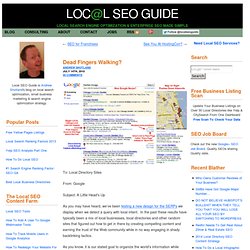
In the past these results have typically been a mix of local businesses, local directories and other random sites that figured out how to get in there by creating compelling content and earning the trust of the Web community while in no way engaging in shady backlinking tactics. As you know, it is our stated goal to organize the world’s information while simultaneously doing no evil. Besides, these companies bought a lot of Adwords clicks to fulfill their inventory commitments for their SMB clients, so we did ok anyhow. Google Details Information Sources for the Business Listing “Cluster” Today in the announcement section of the Google Help forums Google has published a simplified view of where their business listing information comes from.
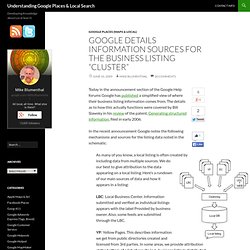
The details as to how this actually functions were covered by Bill Slawsky in his review of the patent, Generating structured information, filed in early 2006. In the recent announcement Google notes the following mechanisms and sources for the listing data noted in the schematic: How To Find The Right Local & Vertical Sites For Your Small Business.
Most small business owners understand that they should be listed on major national search engines such as Google and Bing, but how do they know which local directories and vertical sites are important for improving their SEO? If you’re a dentist in Boston looking for local sites, you could look at the listings of other Boston businesses, such as Boston Standard Plumbing: If you want to find vertical sites, you could look at the listings of other dentists, such as Tribeca Dental Associates in New York: Google Category Tool Updated. We have updated the Google Places Category Tool with a “dump” of current categories and synonyms.
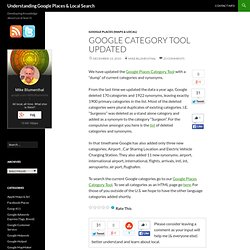
From the last time we updated the data a year ago, Google deleted 170 categories and 1922 synonyms, leaving exactly 1900 primary categories in the list. Most of the deleted categories were plural duplicates of existing categories. I.E. “Surgeons” was deleted as a stand alone category and added as a synonym to the category “Surgeon”. For the compulsive amongst you here is the list of deleted categories and synonyms. In that timeframe Google has also added only three new categories; Airport , Car Sharing Location and Electric Vehicle Charging Station.
Nifty Hard Core Local SEO Tactics From SMX Advanced. The panelists at last week’s “HardCore Local SEO” panel at SMX Advanced, Mike Ramsey of Nifty Marketing, Will Scott of Search Influence and David Mihm of GetListed, presented some excellent data on various tactical approaches to improving Google Place Page rankings.

For today’s column, I thought it would be helpful to excerpt some of the more interesting ideas they presented. I was particularly intrigued by Mike Ramsey’s presentation on research he had done where he compared 28 listings that ranked in the top 7 results for some local queries to 28 listings that did not rank as well. Mike started things off by warning the audience that “correlation does not equal causation“. Why Data Matters, Another Interesting Signal: Direction Requests. Greg Linden, a friend to the site back when I was writing the first book, is writing more lately, and he’s got a great post about Google Maps data that highlights why we’ve decided to focus on “The Data Frame” for the Web 2 Summit this year.
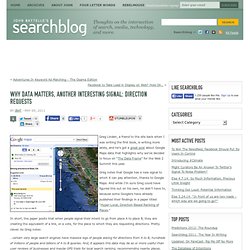
Greg notes that Google has a new signal to which it can pay attention, thanks to Google Maps. And while I’m sure Greg could have figured this out on his own, he didn’t have to, because some Googlers have already published their findings in a paper titled “Hyper-Local, Direction-Based Ranking of Places.” In short, the paper posits that when people signal their intent to go from place A to place B, they are creating the equivalent of a link, or a vote, for the place to which they are requesting directions. Pretty clever. As Greg notes: Better access to your content is, well, better - Google Places Blog. Google Places makes it quick and easy for you to tell your friends, and the world, what you think about the places you visit.
